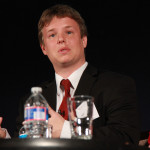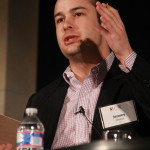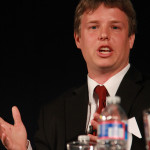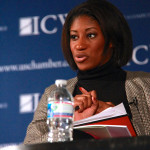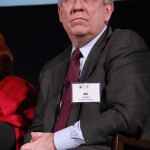WASHINGTON — Former Education Department Secretary Margaret Spellings said Tuesday that the U.S. education system must broaden its focus to reach all students and equip them with the skills employers are seeking.
“We’ve done a pretty good job of educating elites, but that’s not what we’re called to do now,” Spellings said at a higher education forum hosted by the U.S. Chamber of Commerce.
Spellings’ address, delivered to an audience made up mostly of education experts, was a call for business leaders and students to get involved in the overhaul of the U.S. education system. It must be tailoredto the skills most desired by today’s employers, she said. .
Spellings said significant attention should be paid to the so-called skills gap since many positions at some businesses are left unfilled for want of highly skilled or specialized workers.
“Businesses are struggling to find talent,” she said. “Business leaders and students are critical stakeholders in the demand side for higher education but often neither are adequately represented at the table.”
Spellings, who served in President George W. Bush’s administration, praised President Barack Obama’s goal that 60 percent of young Americans earn a college degree by 2020. Obama outlined that benchmark in his 2009 State of the Union address, saying the U.S. should once again lead the world in having the highest proportion of college graduates.
However, Spellings cautioned that the quantity of degrees awarded isn’t necessarily indicative of their quality. More attention should be focused on whether degrees measure skills that employers actually seek, she said.
In Florida, a project is under way to gather statistics on how college graduates fare in the job market. Kathleen Shanahan of Uretek Holdings cited Florida’s initiative listing the number of students in each degree program at state-assisted colleges, their jobs after graduation and their annual salaries.
“We have to change the institutions to challenge their formula and their structure to be much more adaptive to real-world skill sets and jobs that are out there,” said Shanahan, a CEO in Lakeland, Fla.
Bill Kamela, a senior director at Microsoft Corp., said that his company has 6,300 job openings, with 3,600 reserved for computer scientists and engineers. That high number of reserved jobs, he said, highlights the importance of science, technology, engineering and math degrees.
STEM positions account for more than half of employment in some industries, according to the U.S. Bureau of Labor Statistics.
“It’s really important to look at what we’re doing not only at the college level but at high schools and all up and down the spectrum,” he said, adding that only nine states nationwide count computer science as a core class in high school.
Students, preparing for the work force, must be exposed to different job areas, said Aaron Smith, a co-founder of Young Invincibles, a group that advocates for young adults.
“It’s very hard to expect a 19-year-old to know what they want to do with their life,” Smith said. ” Having as many opportunities as you can to work with different types of businesses is critical.”


